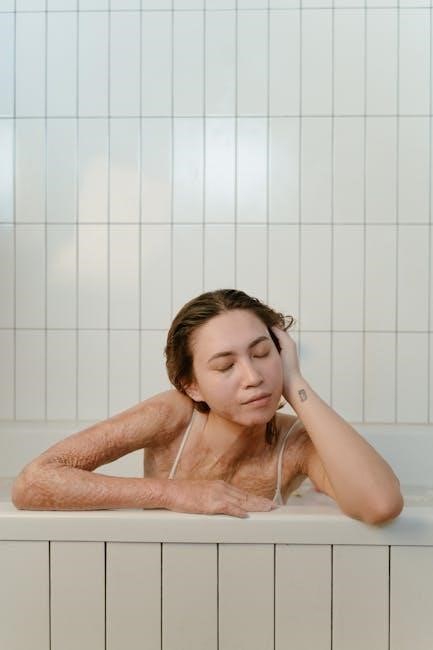Sleep hygiene, or higiene del sueño, refers to practices that promote better sleep quality. Experts like Dr. Julia Santin emphasize routines and environments that enhance restorative sleep, supported by Spanish-language guides and resources.
Definition and Importance of Sleep Hygiene
Sleep hygiene, or higiene del sueño, refers to a set of practices and habits designed to improve sleep quality and duration. It involves creating an environment and routine that promotes restorative sleep, essential for physical and mental health. Experts like Dr. Julia Santin highlight its importance in preventing sleep disorders and enhancing overall well-being. Proper sleep hygiene helps regulate the body’s circadian rhythm, reducing the risk of chronic conditions such as hypertension and cardiovascular diseases. By addressing factors like noise, light, and temperature, individuals can create a sleep-conducive environment. Regular physical activity, avoiding stimulants, and maintaining a consistent sleep schedule are key components. Prioritizing sleep hygiene fosters better health, cognitive function, and emotional stability, making it a vital aspect of daily life.
Overview of Sleep Hygiene Practices in Spanish-Language Resources
Spanish-language resources on sleep hygiene emphasize practical strategies to enhance sleep quality. Guides and checklists often highlight maintaining consistent sleep schedules, avoiding stimulants like caffeine and nicotine, and creating calming bedtime routines. Experts such as Dr. Julia Santin recommend physical activity during the day and relaxation techniques before bed. Many resources stress the importance of a quiet, dark sleep environment and limiting screen time before sleep. Additionally, they address common challenges like noise, light, and temperature, offering solutions to improve sleep conditions. These materials are designed to be accessible, providing tips for all age groups, including children and older adults, to foster healthier sleep habits and overall well-being.

Key Tips for Improving Sleep Hygiene
Avoid stimulants and electronics before bed, create a restful environment, and maintain a consistent sleep schedule to enhance sleep quality and overall well-being effectively.

Maintaining a Consistent Sleep Schedule
Keeping a regular sleep schedule is essential for improving sleep quality. Experts recommend going to bed and waking up at the same time every day, including weekends. This consistency helps regulate the body’s internal clock, ensuring better rest. Avoid long naps during the day, as they can disrupt nighttime sleep. Establishing a calming pre-sleep routine, such as reading or taking a warm bath, signals the body it’s time to rest. A consistent schedule strengthens the circadian rhythm, making it easier to fall asleep and stay asleep, while also enhancing overall well-being and energy levels during the day. Stick to your routine diligently for optimal results.
Creating a Relaxing Sleep Environment
Creating a calming sleep environment is crucial for improving sleep quality. Ensure your bedroom is quiet, dark, and cool, as these conditions promote better rest. Use earplugs, blackout curtains, or a white noise machine if necessary. Avoid screens and electronic devices before bed, as their light can disrupt your circadian rhythm. Invest in a comfortable mattress and pillows, and keep the room tidy to create a peaceful atmosphere. Consider using aromatherapy or soft lighting to enhance relaxation. Reserve the bed for sleep and intimate activities to associate it with rest. A well-designed sleep environment helps signal to your body that it’s time to wind down, leading to deeper and more restorative sleep.

Benefits of Good Sleep Hygiene
Good sleep hygiene enhances physical health, reducing risks of hypertension and cardiovascular diseases. It also improves mental clarity and emotional stability, promoting overall well-being.
Physical Health Benefits
Adequate sleep significantly improves physical health, reducing the risk of chronic conditions like hypertension and cardiovascular diseases. It supports immune function, lowers inflammation, and regulates hormones essential for growth and repair. Proper sleep hygiene helps maintain a healthy metabolism, preventing obesity and related disorders. Studies indicate that consistent sleep patterns can enhance glucose regulation, reducing diabetes risk. Additionally, better sleep quality strengthens the body’s ability to recover from illnesses and injuries. Prioritizing sleep hygiene fosters overall physical well-being, ensuring the body operates efficiently. By addressing factors like noise and light, individuals can optimize their sleep environment, promoting long-term health benefits.
Mental and Emotional Well-being
Good sleep hygiene has a profound impact on mental and emotional health. It enhances emotional stability, reducing stress and anxiety levels. Adequate sleep improves cognitive function, including concentration and mood regulation, which are essential for emotional well-being. Research shows that consistent sleep patterns can lower the risk of depression and anxiety disorders. Sleep helps process emotions, fostering resilience against psychological challenges. Additionally, proper sleep hygiene supports better decision-making and problem-solving skills, contributing to a more balanced emotional state. Spanish-language resources emphasize the importance of maintaining healthy sleep habits to promote mental health and overall quality of life. Prioritizing sleep hygiene is a key step toward achieving emotional well-being.
Common Challenges and Solutions
Common sleep challenges include noise, light, and temperature disruptions. Solutions involve using earplugs, blackout curtains, or a thermostat. Addressing these factors can significantly improve sleep quality.
Addressing Factors Like Noise, Light, and Temperature
Noise, light, and temperature are common disruptors of sleep. To address these, experts recommend using earplugs or white noise machines to block unnecessary sounds. Blackout curtains can reduce light exposure, while maintaining a cool bedroom temperature (around 16-20°C) promotes deeper sleep. Avoiding screens before bed helps reduce blue light emission, which can interfere with melatonin production. Additionally, ensuring the bedroom is quiet and dark creates a conducive environment for rest. These adjustments can significantly improve sleep quality and duration, helping individuals achieve a restorative night’s sleep consistently.
Managing Stimulants and Electronic Devices
Stimulants like caffeine, nicotine, and alcohol can disrupt sleep patterns and reduce sleep quality. Consuming these substances, especially in the hours leading up to bedtime, can make it harder to fall asleep and stay asleep. Additionally, electronic devices emit blue light, which can suppress melatonin production, delaying sleep onset. Experts recommend avoiding screens for at least an hour before bed and using blue light filtering glasses or apps. Regular physical activity during the day can also help reduce stimulant sensitivity and improve sleep. By limiting exposure to stimulants and electronic devices, individuals can create a sleep-friendly environment that supports better rest and overall well-being.
Improving sleep hygiene requires consistent practices and awareness. Spanish-language guides, like expert-endorsed PDFs, offer practical tips and checklists to enhance sleep quality. Download these resources for better rest.

Final Recommendations for Better Sleep
Adopting consistent sleep hygiene practices is essential for improving sleep quality. Establish a regular sleep schedule, avoiding stimulants like caffeine and nicotine before bed. Create a calming environment by ensuring the bedroom is quiet, dark, and cool. Limit screen time and avoid heavy meals close to bedtime. Engage in relaxing activities, such as reading or taking a warm bath, to signal your body it’s time to rest. Regular physical activity, preferably outdoors, can also enhance sleep. For further guidance, Spanish-language PDF guides provide detailed checklists and tips tailored to different needs, including adults and the elderly. By following these steps, you can achieve restorative sleep and improve overall well-being.
Spanish-Language PDF Guides and Checklists
Spanish-language PDF guides and checklists are valuable resources for improving sleep hygiene. These materials, often created by sleep specialists like Dr. Julia Santin, provide practical tips and structured plans. They include recommendations for maintaining consistent sleep schedules, creating a relaxing sleep environment, and avoiding stimulants. Many guides are tailored for specific groups, such as adults, the elderly, and even babies, addressing unique challenges. Checklists help users track progress and implement habits effectively. These resources emphasize the importance of physical activity, avoiding screens before bed, and promoting a calming pre-sleep routine. By following these guides, individuals can enhance their sleep quality and overall health, making them indispensable tools for better rest.